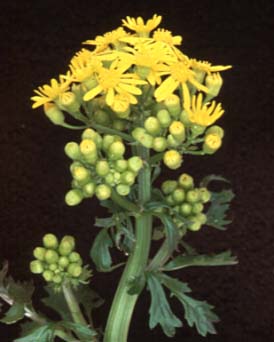- Return to Article Of The Month index
Preventing Animal Loss From Plant Poisoning
April, 2010
Bridget Carlisle - Extension Agent II - Livestock,
UF/IFAS Polk County Extension
 Today I received a call from a cattleman who has been experiencing animal losses due to plant toxicity from a weed in his pasture. Unfortunately, with this particular plant, there is not much that can be done for the animals that are already affected. However, losses from plant toxicity can be largely prevented.
Today I received a call from a cattleman who has been experiencing animal losses due to plant toxicity from a weed in his pasture. Unfortunately, with this particular plant, there is not much that can be done for the animals that are already affected. However, losses from plant toxicity can be largely prevented.
Being aware of the varieties of plants that your animals have access to is the first and most important step in preventing losses. Early diagnosis is another important phase in controlling losses of those already affected by poisonous plants. In cases of suspected plant poisoning in livestock, a veterinarian should be consulted as early as possible to minimize losses.
Above photo is of
Cressleaf groundels (S. glabellus) or butterweed.
Under normal circumstances, most animals will not eat poisonous plants. However, conditions such as starvation, deficient rations, overgrazing, poor pasture management, curiosity, and other circumstances are associated with plant poisoning in Florida.
The most common plants to look for in your pastures or areas near your farm animals are Tung-oil tree, Prickly poppy, Boxwood, Showy crotalaria, Jimsonweed, Purple rattlebox, Carolina-jessamine (Evening trumpet-flower), Bagpod, Bitterweed, Hydrangea, Common lantana, Chinaberry, Common oleander, Pokeweed, Bracken, Oaks, Castor-bean, Elderberry, Common nightshade, Sorghum, Carolina laurel-cherry, Black cherry, Johnson grass, Perilla mint, Cocklebur, and Atamasco-lily. Some of these plants are also ornamental plants used in landscaping. Other less common weeds, such as butterweed, have caused significant losses.
To prevent plant poisoning of your animals, become fully aware of the varieties of plants that your animals have access to and avoid the conditions that lead to animals grazing these noxious plants.
For more information on this subject, consult the University of Florida publication titled “Plants that poison farm animals” by Erdman West and M.W. Emmel or the Extension Office. This article was developed from the above referenced publication.

